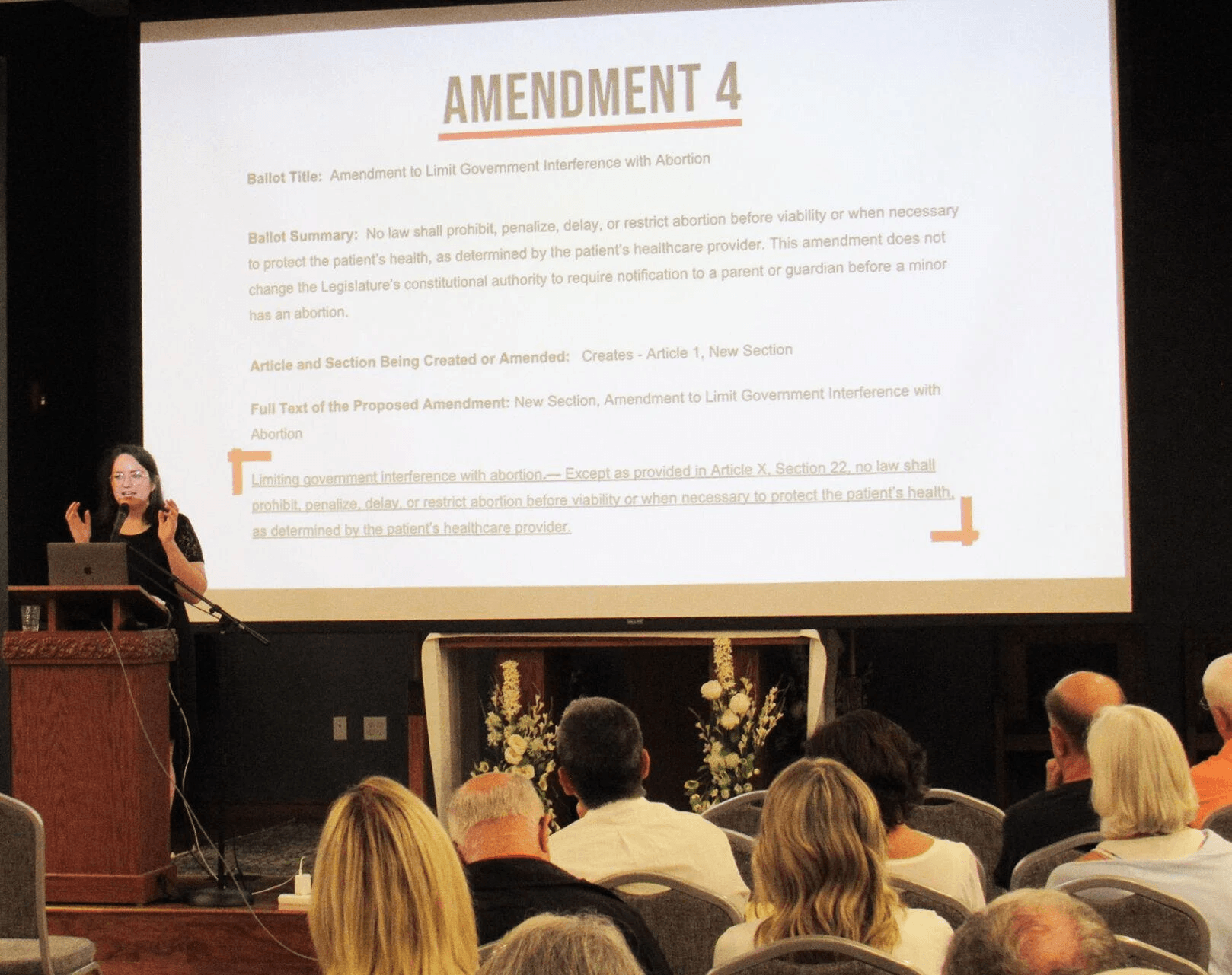
PALM BEACH GARDENS | To help local Catholics understand Amendment 4 on Florida’s November election ballot, which would legalize full-term abortion and remove all protections for preborn children, a presentation was held on a rainy June 12 at the Cathedral of St. Ignatius Loyola in partnership with the Diocese of Palm Beach and Catholic Charities. The main speaker was Sara Johnson, statewide grassroots director for the Vote No on 4 campaign, which is endorsed by the Florida Conference of Catholic Bishops.
“The Florida Conference of Catholic Bishops is working hard to oppose this cruel and dangerous amendment and urge all Floridians to vote no on Amendment 4,” said Deanna Herbst-Hoosac, Respect Life program director with Catholic Charities. “This amendment would eliminate all efforts made for abortion laws advocated by our bishops during Catholic Days at the Capitol.”
In an April statement, the state’s bishops urged “all Floridians of goodwill to stand against the legalization of late-term abortion and oppose the abortion amendment. In doing so, we will not only protect the weakest, most innocent and defenseless of human life among us but also countless women throughout the state from the harms of abortion.”
As explained from the start by Jennifer Trefelner, diocesan director of communications and development, Catholic teaching is nonpartisan. She read from the FCCB election guide, which says, “While individual citizens are free to engage fully in partisan politics, churches and other 501(c)(3) institutions that qualify for tax-exempt status under the IRS are not. The church and church organizations may not be involved in partisan politics.”
Trefelner added, however, that the church can take positions on legislation and proposed amendments and share its teaching on human life, human rights, social justice, the common good and peace. It can highlight the moral and ethical dimensions of public policy issues and can urge parishioners to register to vote and participate in elections. She encouraged attendees to access information explaining Amendment 4 on websites maintained by the diocese, Catholic Charities and FCCB.
“Why should we use those words on the FCCB’s informational website and those resources? Because people have spent a lot of time to do beta testing, testing our markets and understanding, based on research, what language is going to resonate the most when we’re talking to people about understanding Amendment 4. Those words that are used are used for a specific reason,” Trefelner said.
Johnson was chosen to present educational talks throughout Florida that warn voters about Amendment 4 and the need to defeat it Nov. 5. The summary of Amendment 4 (formally titled “Amendment to Limit Government Interference with Abortion”) that will be on the ballot is: “No law shall prohibit, penalize, delay, or restrict abortion before viability or when necessary to protect the patient’s health, as determined by the patient’s healthcare provider. This amendment does not change the Legislature’s constitutional authority to require notification to a parent or guardian before a minor has an abortion.”
If the amendment passes, “Those are all of the words that will define Florida’s life policy,” she said. “The Legislature can’t pass anything that contradicts that or that would undo that. This would be enshrined in our constitution as our policy.” Breaking down the wording, Johnson revealed what makes the amendment so dangerous to unborn life and pregnant women.
To promote clarity and fairness, legal documents, such as a constitutional amendment, routinely include definitions of the terms used in them. There are no definitions provided with Amendment 4 that explain the terms “healthcare provider,” “patient’s health,” “viability” or “government interference.”
“There’s no separate section of this amendment that has definitions for any of these terms that says you should be in a regulated industry, that you should have a medical license, that you should be overseen by any department or authorized by any medical board in Florida,” Johnson said. “‘Healthcare provider?’ Your guess is as good as mine as to what that actually means.”
Without a clear definition, non-medical employees of abortion centers could be allowed to approve abortions, she said, thus removing physicians from the decision-making process concerning the procedure and viability (the ability of preborn children to survive outside the womb).
“When you put it all together, what it would do and the definitions that it doesn’t have, when you look at the lack of terms in this amendment, it would allow for late-term abortion when the baby is capable of feeling pain,” Johnson said. “Now, it doesn’t matter if you’re pro-life or pro-choice. Most voters do not believe that abortion should take place when a baby is capable of feeling pain in late terms of pregnancy. That’s what this amendment would enshrine in our (state) constitution.”
Since Amendment 4 says that it “does not change the Legislature’s constitutional authority to require notification to a parent or guardian before a minor has an abortion,” people think it safeguards parents’ rights, she said. But they would be wrong.
“What you don’t realize is that, in (current) state law, parents have to give consent for an abortion to take place,” Johnson said. “So, this amendment sounds like it would preserve the status quo with parental notification, but it would actually strip parental consent because that exists in our state law.” The term “consent” means parents must give permission before an abortion is performed on a minor; “notification” means parents would be told that an abortion was taking place.
One of Johnson’s main points is that words matter when it comes to legal documents, and those who proposed the amendment carefully chose the wording. The amendment began as a petition drive led by three main groups: Planned Parenthood, the American Civil Liberties Union and the Open Society Foundation, funded by billionaire businessman George Soros. Nearly 1 million petition signatures were obtained in Florida.
With approval from the Florida Supreme Court, the amendment was put on the November ballot. Johnson said it’s not an accident that Amendment 4 appears deceptive. “They spent $20 million to get this to the ballot. They knew what they had written when they did it, and they wrote it intentionally,” she said.
For constitutional amendments to pass in Florida, 60% of voters have to approve. That means at least 40% of voters (about 4.1 million) need to vote no on Amendment 4, Johnson said, which requires all who support the sanctity of human life to be informed and warn others about the amendment that would radically change the abortion issue in Florida.
“That is a Herculean number. There aren’t 4.1 million people here (at this informational session), but we have to go talk to 4.1 million,” she said. “So, with your help, I believe we can get there.”
Prior to Johnson’s presentation, a video featuring Bishop Gerald M. Barbarito was shown, in which he speaks about Amendment 4. Unfortunately, the bishop was at the U.S. Conference of Catholic Bishops meeting in Kentucky and unable to attend the June 12 event.
Ellen Wayne, CEO of Catholic Charities, emphasized the life-giving work done by dedicated staff and volunteers at Catholic Charities’ Birthline/Lifeline pregnancy care centers and Women’s Pregnancy Solutions mobile units.
“They’re vigilant, they’re competent and they are steady stewards of our fundamental belief in the sanctity of life,” she said. “You can be assured that, for them, this threat to what we hold sacred has only served to further their resolve to outreach, to engage and to support expectant women and new parents, and has further strengthened the resolve of our agency as a whole, not just to stand firm in opposition to abortion, but to remain steadfast in our efforts to counter any threat to the poor and marginalized and vulnerable members of our community.”
To learn more about the constitutional amendment being voted on in November, visit www.diocesepb.org/abortion-amendment.html, which includes Bishop Barbarito’s video mentioned above, or https://flaccb.org/abortion-amendment.

